(完整版)新概念第一册_51课_1
新概念第一册_51课ppt课件
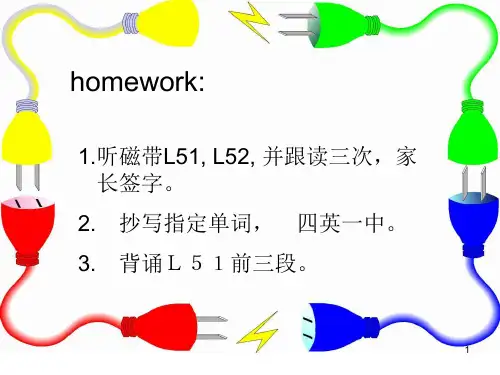
Nationality
American
Brazilian
Dutch
English
French
Germany
Italian
Norwegian
Russian
Spanish
Swedish
41
Where do they come from?
It c_o_m__e_s from_th_e__U_._S_. . They c_o_m__efrom B_r_a_z_il .
England Australia Canada
France Greece
5
Lesson51 A pleasant climate
6
spring
seasons summer
autumn
winter
7
spring summer autumn winter weather warm climate pleasant
46
Where do they come from?
It c_o_m__e_s from _S_p_a_in_. They c_o_m__e from R_u_s_s_ia_ .
47
42
Words
the U.S. Brazil Holland England France Germany Italy Norway Russia Spain Sweden
美国 巴西 荷兰 英国 法国 德国 意大利 挪威 俄罗斯 西班牙 瑞典
43
Where do they come from?
It c_o_m__e_s from E_n_g_l_a_n_d. They c_o_m__e from H__o_lla_n_d_ .
新概念英语第一册自学笔记含课后练习答案:Lesson51-52
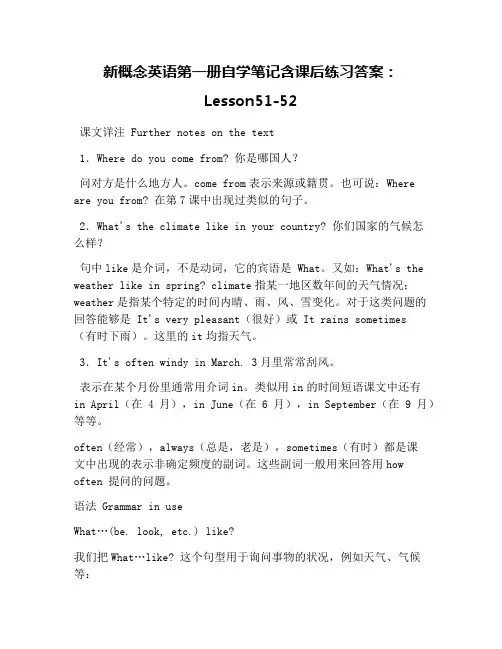
新概念英语第一册自学笔记含课后练习答案:Lesson51-52课文详注 Further notes on the text1.Where do you come from? 你是哪国人?问对方是什么地方人。
come from表示来源或籍贯。
也可说:Where are you from? 在第7课中出现过类似的句子。
2.What's the climate like in your country? 你们国家的气候怎么样?句中like是介词,不是动词,它的宾语是 What。
又如:What's the weather like in spring? climate指某一地区数年间的天气情况;weather是指某个特定的时间内晴、雨、风、雪变化。
对于这类问题的回答能够是 It's very pleasant(很好)或 It rains sometimes(有时下雨)。
这里的it均指天气。
3.It's often windy in March. 3月里常常刮风。
表示在某个月份里通常用介词in。
类似用in的时间短语课文中还有in April(在4月),in June(在 6月),in September(在 9月)等等。
often(经常),always(总是,老是),sometimes(有时)都是课文中出现的表示非确定频度的副词。
这些副词一般用来回答用howoften 提问的问题。
语法 Grammar in useWhat…(be. look, etc.) like?我们把What…like? 这个句型用于询问事物的状况,例如天气、气候等:What's the weather like today? 今天天气怎么样?What's it like today? 今天怎么样?What's the climate like in your country? 你们国家气候怎么样?或询问人物或事物的外观或特征:What's your brother like? 你兄弟是个什么样子?What's your house like? 你的房子是什么样的?很多形容词可用以回答What…like? 这样的问题,并可根据上下文给以笼统的或确切的信息。
新概念第一册 51课 lesson51PPT课件
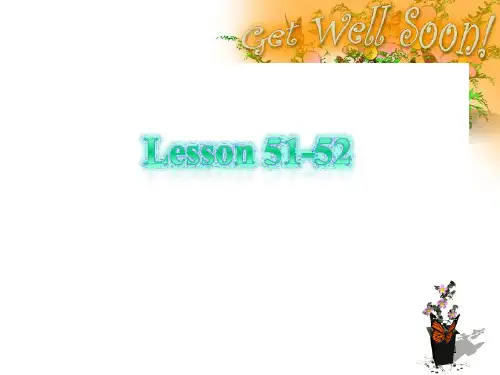
Q2: Does it ever snow in Greece?
Yes, it snows sometimes.
新概念英语1-051.rm
lesson51.mp3
18
Retell the dialogue
Spring Windy Warm Rains
March April and May sometimes
19
Lesson 52
What nationality are they? Where do they corican the U. S.
Where do you come from? I come from the U. S.
What nationality are you? I am American.
Lesson 51 & Lesson 52
Your teacher: Lynn 7
New words and expressions
8
9
spring
flowers grass green
warm
10
The spring is coming. It is warm in spring.
It rains sometimes.
3
时态(tense) 一般现在时 ( the present tense) 现在进行时 ( the present continuous 一ten般se将) 来时 ( the future tense)
4
Page 4
Tina 每天都去超市。 Tina goes to the Supermarket
1
Let’s do a revision
新概念英语第一册第51-52课:A pleasant climate
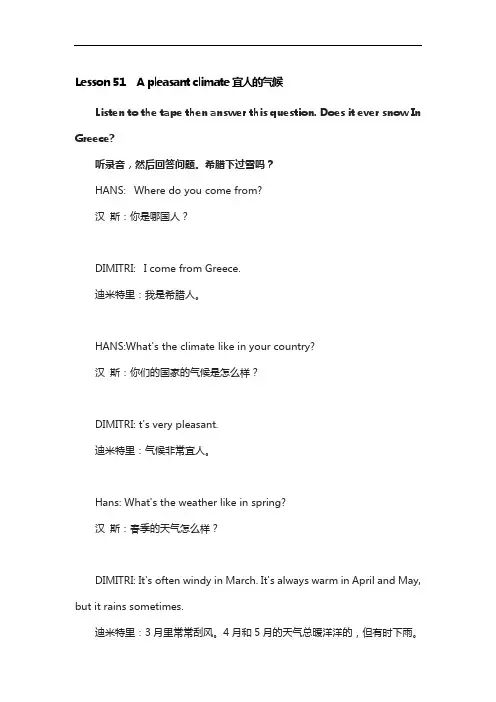
Lesson 51 A pleasant climate宜人的气候Listen to the tape then answer this question. Does it ever snow In Greece?听录音,然后回答问题。
希腊下过雪吗?HANS: Where do you come from?汉斯:你是哪国人?DIMITRI: I come from Greece.迪米特里:我是希腊人。
HANS:What's the climate like in your country?汉斯:你们的国家的气候是怎么样?DIMITRI: t's very pleasant.迪米特里:气候非常宜人。
Hans: What's the weather like in spring?汉斯:春季的天气怎么样?DIMITRI: It's often windy in March. It's always warm in April and May, but it rains sometimes.迪米特里:3月里常常刮风。
4月和5月的天气总暖洋洋的,但有时下雨。
HANS: What's it like in summer?汉斯:夏季的天气如何呢?DIMITRI: It's always hot in June, July and August. The sun shines every day.迪米特里:6月、7月和8月的天气总是炎热的。
每天都出太阳。
HANS: Is it cold or warm in autumn?汉斯:秋季的天气是冷还是暖呢?DIMITRI: It's always warm in September and October. It's often cold in November and it rains sometimes.迪米特里:9月和10月总是很暖和,11月常常就冷了,而且有时下雨。
新概念英语第一册第51-52课ppt
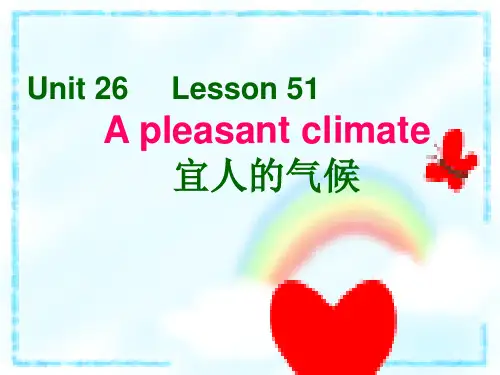
come from:来自
Where
do you come from? Do you come from China? I come from China. I don’t come from China. I come from Greece(希腊)
Match the words 连线
DIMITRI comes from Greece. It’s always warm in April and May × It rains sometimes in summer The sun shines every day in autumn It’s often cold in December
1country
国土
2.nationality
3.nation nd
国籍
乡下 ,国家
民族
Lesson 52 What nationality are they? Where do they come from?
新单词 :the U.S.、Brazil、Holland、England、 France、Germany、Italy、Norway、Russia、 Spain、Sweden American、Brazilian、Dutch、English、 French、German、Greek、Italian、Norwegian、 Russian、Spanish、Swedish lesson 51-52.rm
HANS:Is it cold or warm in autumn? It’s always warm in September and October. It’s often cold in November and it rains sometimes. HANS:Is it very cold in winter? What is it in winter? DIMITRI:It’s often cold in December, January and February. It snows sometimes.
新概念英语第一册 Lesson 51-52课 (共40张ppt)

overcast /ˈəʊvəˌkæst/ 阴天的 drizzle /ˈdrɪzəl/ 毛毛雨 shower /ˈʃaʊə/ 阵雨 downpour /ˈdaʊnˌpɔː/ 暴雨 blizzard /ˈblɪzəd/ 暴风雪 fog /fɒɡ/ 雾 haze /heɪz/ 雾霾 breeze /briːz/ 微风 hurricane /ˈhʌrɪkən, -keɪn/ 飓风 typhoon /taɪˈfuːn/ 台风 tornado /tɔːˈneɪdəʊ/ 龙卷风 storm /stɔːm/ 暴风雨 thunder /ˈθʌndə/ 雷
1-19,除第1-3,其余均在末尾加 th,但5、8、9、12的写法特殊。
第20-90,整数,基数词尾y变i,再 加eth.
两位数的词,将个位变成序数词, 三位数则将后两位变成序数词。
一月二号 January 2/Jan.2 January the second 二月20号 February 20(th)/Feb.22(th) February the twentieth
China Russia England Canada Austrilia Japan India America Brazil Holland France
Chinese Russian English Canadian Austrilian Japanese Indian American Brazilian Dutch French
hail /heɪl/ 冰雹 frost /frɒst/ 霜 lightning /ˈlaɪtnɪŋ/ 闪电
新概念一册第51课
v. v. v. v.
下雨 下雪 刮风 照耀
1. snow 2. rain 3. shine 4. wind
adj. adj. adj. adj. adj. adj. adj.
有风的 下雨的 下雪的 温暖的 寒冷的 严热的 宜人的
1. pleasant 2. windy 3. rainy 4. snowy 5. warm 6. cold 7. hot
-Where do you come from? -I come from … (+country)
-你来自于哪个国家? -我来自于 … -What’s the climate like in your country? -It’s very pleasant.
-你们国家的气候怎么样? -气候非常宜人。
2. cli mate
/ 'klai mit /
n. 气候
长时间的天气状况或 数年间的天气情况
weather n. 天气
某一特定时间内的各种 天气变化,比如说:风、 雪、阴、晴等
e.g. -What’s the weather like today? -It’s a fine day today. e.g. -What’s the climate like in your country(国家)?
n. 冬天
December January
February
It snows sometimes.
v.下雪
It’s cold in winter.
adj.冷的
n. n. n. n. n. n. n. n.
肴腊 气候 天气 国家 春天 夏天 秋天 冬天
1. spring 2. country 3. weather 4. climate 5. Greece 6. winter 7. autumn 8. summer
新概念英语一 51课课件
rain sandstorm season short dry cold snow hot
cold in winter, and it In Beijing, it is _____ snows usually. In summer, it is _____ hot _____ rains . Spring is very and it often _____ short and there is little rain but it’s _____ quite windy _____ and sometimes there are sandstorm season in _____ .Autumn is the best _____ Beijing. It’s very comfortable.
climate 长时间的天气状况或数年间 的天气情况. weather 某一特定时间内的各种天 气变化, 比如说风、雨、雾等.
句型:What……like?用来询问事物的情 况,例如天气、气候等,或是询问人或 事物的外观或特征。用形容词回答。
e.g. What’s the weather like today? What’s the climate like in your country?
(完整版)新概念英语第一册课文word版(按课分页建议四合一打印)(可编辑修改word版)
新概念英语第一册课文Lesson1: Excuse me! Excuse me!Yes?Is this your handbag? Pardon?Is this your handbag? Yes, it is.Thank you very much.Lesson 3:Sorry sir.My coat and my umbrella please. Here is my ticket.Thank you sir.Number five.Here is your umbrella and your coat. This is not my umbrella.Sorry sir.Is this your umbrella?No, it isn't.Is this it?Yes, it is.Thank you very much.Lesson 5: Nice to meet you.Good morning.Good morning, Mr. Blake.This is Miss Sophie Dupont. Sophie is a new student. She is a French.Sophie, this is Hans.He is German.Nice to meet you.And this is Naoko. She’s Japanese.Nice to meet you.And this is Chang-woo. He’s Korean.Nice to meet you.And this is Luming.He’s Chinese.Nice to meet you.And this is Xiaohui. She’s Chinese, too.Nice to meet you.Lesson 7: Are you a teacher? I’m a new student.My name’s Robert.Nice to meet you.My name’s Sophie.Are you French?Yes, I’m.Are you French, too?No, I’m not.What nationality are you?I’m Italian.Are you a teacher?No, I’m not.What’s your job?I’m a keyboard operator. What’s your job?I’m an engineer.Lesson 9: How are you today? Hello, Helen.Hi, Steven.How are you today?I’m very well, Thank you.And you?I’m fine, thanks.How is Tony?He’s fine, Thanks.How’s Emma?She’s very well, too, Helen. Goodbye, Helen.Nice to see you.Nice to see you, too, Steven. Goodbye.Lesson 11: Is this your shirt? Whose shirt is that?Is this your shirt, Dave? No, sir.It’s not my shirt.This is my shirt.My shirts blue.Is this shirt Tim’s?Perhaps it is, sir.Tim’s shirts white.Tim!Yes, sir.Is this your shirt?Yes, Sir.Here you are.Catch.Thank you, sir.Lesson 13: A new dress What color is your new dress? It is green.Come upstairs and see it. Thanks you.Look!Here it is!That’s a nice dress.It’s very smart.My hat’s new, too.What color is it?It’s the same color.It’s green, too.That’s a lovely hat.Lesson 15: Your passport, please.Are you Swedish?No, we are not. We are Danish.Are your friends Danish, too?No, they aren’t. They are Norwegian.Your passport, please.Here they are.Are there your cases?No, they aren’t. Our cases are brown. Here they are. Are you tourists?Yes, we are.Are your friends tourists too?Yes, they are.That’s fine.Thank you very much.Lesson 17: How do you doCome and meet our employees, Mr. Richards. Thank you, Mr. Jackson.This is Nicola Grey, and this is Claire Taylor. How do you do?Those women are very hard-working.What are their jobs?They’re keyboard operators.This is Michael Baker, and this is Jeremy Short. How do you do?They aren’t very busy!What are their jobs?T hey’re sales reps.They are very lazy.Who is this young man?This is Jim.He is our office assistant.Lesson 19: Tired and thirsty What’s the mater, children? We are tired and thirsty, Mum. Sit down here.Are you all right now?No, we aren’t.Look!There’s an ice cream man. Two ice creams please.Here you are, children. Thanks, Mum.There ice creams are nice. Are you all right now?Yes, we are, thank you.Lesson 21: Which book? Give me a book please, Jane. Which book?This one?No, not that one. The red one. This one?Yes, please.Here you are.Thank you.Lesson 23: Which glasses?Give me some glasses please, Jane. Which glasses?These glasses.No, not those. The ones on the shelf. These?Yes, please.Here you are.Thanks.Lesson25: Mrs. Smith’s kitchenMrs. Smith’s kitchen is small.There is a refrigerator in the kitchen. The refrigerator is white.It is on the right.There is an electric cooker in the kitchen. The cooker is blue.It is on the left.There is a table in the middle of the room. There is a bottle on the table.The bottle is empty.There is a cup on the table, too.The cup is clean.Lesson 27: Mrs. Smith’s living room Mrs. Smith’s living room is large.There is a television in the room.The television is near the window.There are some magazines on the television. There is a table in the room.There are some newspapers on the table. There are some armchairs in the room. The armchairs are near the table.There is a stereo in the room.The stereo is near the door.There are some books on the stereo. There are some pictures in the room.The pictures are on the wall.Lesson 29: Come in, Amy.Come in, Amy.Shut the door, please.This bedroom is very untidy.What must I do, Mrs. Jones?Open the window and air the room.Then put these clothes in the wardrobe.(衣橱)Then make the bed.Dust the dressing table.Then sweep the floor.Lesson31: Where’s Sally? Where’s Sally, Jack? She’s in the garden, Jane. What’s she doing?She’s sitting under the tree. Is Tim in the garden, too? Yes, he is.He’s climbing the tree.I beg your pardon?Who’s climbing the tree. Tim is.What about the dog?The dog’s in the garden, too. It’s running across the grass. It’s running after a cat.It’s a fine day today.There are some clouds in the sky, but the sun is shining. Mrs. Jones’s with his family.They are walking over the bridge.There are some boats on the river.Mrs. Jones and his wife are looking at them.Sally is looking at a big ship.The ship is going under the bridge.Tim is looking at an aeroplane.The aeroplane is flying over the river.This is a photograph of our village.Our village is in a valley.It is between two hills.The village is on a river.Here is another photograph of the village.My wife and I are walking alone the banks of the river. We are on the left.There is a boy in the water.He is swimming across the river.Here is another photograph.This is the school building.It is beside a park.The park is on the right.Some children are coming out of the building.Some of them are going into the park.Lesson37: Making a bookcaseYou’re working hard, George.What are you doing?I’m making a bookcase.Give me that hammer please, Dan.Which hammer.This one?No, not that one. The big one.Here you are.Thanks, Dan.What are you going to do now, George?I’m going to paint it.What colour are you going to paint it?I’m going to paint it pink.Pink!This bookcase isn’t for me. It’s for my daughter, Susan.Pink’s her f avorite colour.Lesson39: Don’t drop it!What are you going to do with that vase, Penny? I’m going to put it on this table, Sam.Don’t do that.Give it to me.What are you going to do with it?I’m going to put it here, in front of the window. Be careful.Don’t drop it!Don’t put it there, Sam.Put it here, on this shelf.There we are!It’s a lovely vase.Those flowers are lovely, too.Lesson41: Penny’s bagIs that bag heavy, Penny? Not very.Here!Put it on this chair.What’s in it?A piece of cheese.A loaf of bread.A bar of soap.A bar of chocolate.A bottle of milk.A pound of sugar.Half a pound of coffee.A quarter of a pound of tea. And a tin of tobacco.Is that tin of tobacco for me?Well, it’s certainly not for me!Lesson43: Hurry up!Can you make the tea, Sam?Yes, of course I can, Penny.Is there any water in this kettle(水壶)? Yes, there is.Where’s the tea?It’s over there, behind the teapot.Can you see it?I can see the teapot, but I can’t see the tea. There it is!It’s in front of you.Ah yes, I can see it now.Where are the cups?There are some in the cupboard(碗橱). Can you find them?Yes. Here they are.Hurry up, Sam. The kettle’s boiling.lesson45Can you come here a minute please, Bob?Yes, sir?Where's Miss Jones?She's next door. She's in her office, sir.Can she type this letter for me? Ask her please. Yes, sir.Can you type this letter for the boss please, Miss Jones? Yes, of course I can.Here you are.Thank you, Bob.Bob!Yes? What's the matter?I can't type this letter.I can't read it! The boss's handwriting is terrible!lesson47 A cup of coffeeMRS YOUNG: Do you like coffee, Mrs Price? MRS PRICE: Yes, I do.MRS YOUNG: Do you want a cup?MRS PRICE: Yes, please. Mrs Young.MRS YOUNG: Do you want any sugar?MRS PRICE: Yes, please.MRS YOUNG: Do you want any milk?MRS PRICE: No, thank you. I don't like milk inmy coffee. I like black coffee. MRS YOUNG: Do you like biscuits?MRS PRICE: Yes, I do.MRS YOUNG: Do you want one?MRS PRICE: Yes, please.lesson49 At the butcher’sBUTCHER: Do you want any meat today, MrsBird?MRS BIRD: Yes, please.BUTCHER: This lamb's very good.MRS BIRD: I like lamb, but my husbanddoesn't .BUTCHER: What about some steak? This is anice piece.MRS BIRD: Give me that piece please. BUTCHER: Do you want a chicken, Mrs Bird?They're very nice.MRS BIRD: No, thank you.MRS BIRD: My husband likes steak, but hedoesn't like chicken. BUTCHER: To tell you the truth, Mrs. Bird, Idon't like chicken, either !lesson51 A pleasant climateHANS: Where do you come from?DIMITRI: I come from Greece.HANS: What's the climate like in your country? DIMITRI: It's very pleasant.Hans: What's the weather like in spring? DIMITRI: It's often windy in March. It's always warm in April and May, but it rains sometimes. HANS: What's it like in summer?DIMITRI: It's always hot in June, July and August. The sun shines every day.HANS: Is it cold or warm in autumn?DIMITRI: It's always warm in September and October. It's often cold in November and it rains sometimes. HANS: Is it very cold in winter?DIMITRI: It's often cold in December, January andFebruary. It snows sometimes.lesson53 An interesting climateHANS: Where do you come from?JIM: I come from England.HANS: What's the climate like in your country? Jim: I t's mild(温和的), but it's not alwayspleasant.Jim: The weather's often cold in the North and windy in the East. It's often wet in the Westand sometimes warm in the South.Hans: Which seasons do you like best?Jim: I like spring and summer. The days are long and the nights are short. The sun rises early andsets late. I don't like autumn and winter. Thedays are short and the nights are long. The sunrises late and sets early. Our climate is notvery good, but it's certainly interesting. It'sour favorite subject of conversation.lesson55 The Sawyer familyThe Sawyers live at 87 King Street.In the morning, Mrs Sawyer goes to work and the children go to school. Their father takes them to school every day.Mrs Sawyer stays at home every day. She does the housework. She always eats her lunch at noon.In the afternoon, she usually sees her friends. They often drink tea together.In the evening, the children come home from school. They arrive home early.Mr Sawyer comes home from work. He arrives home late. At night, the children always do their homework. Thenthey go to bed. Mr Sawyer usually reads his newspaper,but sometimes he and his wife watch television.lesson57 An unusual dayIt is eight o'clock. The children go to school by car every day, but today, they are going to school on foot.It is ten o'clock. Mrs Sawyer usually stays at home in the morning, but this morning, she is going to the shops. It is four o’clock. In the afternoon, Mrs Sawyer usually drinks tea in the living-room, but this afternoon, she is drinking tea in the garden.It is six o’clock. In the evening, the children usually do their homework, but this evening, they are not doing their homework. At the moment, they are playing in the garden. It is nine o’clock, Mr. Sawyer usually reads his newspaper at night, but he is not reading his newspaper tonight. At the moment, he is reading an interesting book.lesson59 Is that all?LADY: I want some envelopes please. STATIONER:Do you want the large size, or the small size? LADY: The large size please.LADY: Have you any writing-paperStationer: Yes, we do.Stationer: I haven't any small pads. I only have largeones. Do you want a pad(便签簿)? LADY: Yes, please.LADY: And I want some black ink and some glue. Stationer: A bottler of ink and a bottle of glue. LADY: And I want a large box of chalk, too. Stationer: I only have small boxes. Do you want one? LADY: No, thank you.Stationer: Is that all?LADY: That's all, thank you.Stationer: What else do you want?LADY: I want my change.lesson61MR WILLIANMS: Where's Jimmy?MRS WILLIAMS: He's in bed.MR WILLIAMS: What's the matter with him?MRS WILLIAMS: He feels ill.MR WILLIAMS: He looks ill.MRS WILLIAMS: We must call the doctor.MR WILLIAMS: Yes, we must.MR WILLIAMS: Can you remember the doctor'stelephone number?MRS WILLIAMS: Yes. It's 09754.DOCTOR: Open your mouth, Jimmy.Show me your tongue. Say, 'Ah'.MR WILLIMAMS: What's the matter with him, doctor? DOCTOR: He has a bad cold, Mr Williams, so hemust stay in bed for a week.MRS WILLIAMS: That's good news for Jimmy. DOCTOR: Good news? Why?MR WILLIAMS: Because he doesn't like school!lesson63 Thank you , doctor.How's Jimmy today?He's better , thank you, doctor.Can I see him please, Mrs Williams?Certainly, doctor. Come upstairs.You look very well, Jimmy. You are better now, but you mustn't get up yet. You must stay in bed for another two days.The boy mustn't go to school yet, Mrs Williams. And he mustn't eat rich food.Does he have a temperature, doctor?No, he doesn’t.Must he stay in bed?Yes. He must remain in bed for another two days. He can get up for about two hours each day, but you must keep the room warm.Where's Mr Williams this evening?He's in bed, doctor. Can you see him, please? He has a bad cold, too!lesson65 Not a babyFATHER: What are you going to do this evening, Betty?Betty: I'm going to meet some friends, Dad. FATHER: You mustn't come home late. You must be home at half past ten.BETTY: I can’t get home so early, Dad.Can I have the key to the front door, please? FATHER: NO, you can't.MOTHER: Betty's eighteen years old, Tom. She's not a baby. Give her the key. She always comes home early. FATHER: Oh, all right!FATHER: Here you are. But you mustn't come home after a quarter past eleven. Do you hear?BETTY: Yes, Dad.BETTY: Thanks, Mum.MOTHER: That's all right. Goodbye. Enjoy yourself!BETTY: We always enjoy ourselves, Mum. Bye, bye.Hullo, Mrs Williams. Were you at the butcher's? Yes. I was. Were you at the butcher’s ,too?No, I wasn’ I was at the greengrocer’s.How’s Jimmy today?He’s very well, thank you.Was he absent from school last week?Yes, he was. He was absent on Monday, Tuesday, Wednesday and Thursday. How are you all keeping?(你们身体怎么样?)Very well, thank you. We’re going to spend three days in the country. We’re going to stay at my mother’s for the week-end.Friday, Saturday and Sunday in the country! Aren’t you lucky!There is a car race near our town every year. In 1968, there was a very big race.There were hundreds of people there. My wife and I were at the race. Our friends, Julie and Jack were there, too. You can see us in the crowd. We are standing on the left. There were twenty cars in the race. There were English cars, French cars, German cars, Italian cars, American cars and Japanese cars.It was an exciting finish. The winner was Billy Stewart. He was in car number fifteen. Five other cars were just behind him.On the way home, my wife said to me, “Don’t drive so quickly! You’re not Billy Stewart!”Lesson 71 He’s awfulJane : What’s Ron Marston like , Pauline ?Pauline : He’s awful ! He telephoned me four times yesterday , and three times the day before yesterday.Pauline: He telephoned the office yesterday morning and yesterday afternoon. My boss answered the telephone .Jane : What did your boss say to him ?Pauline: He said ,”Miss White is typing letters .She can’t speak to you now !”Pauline : Then I arrived home at six o’clock yesterday evening .He telephoned again .But I didn’t answer the phone ! Jane : Did he telephone again last night ?Pauline : Yes , he did . He telephoned at nine o’clock .Jane : What did you say to him ?Pauline : I sa id ,”This is Pauline ‘s mother . Please don’t telephone my daughter again !”Jane : Did he telephone again ?Pauline : No , he didn’t !。
新概念第一册 L51
零冠词
• 1.国家名、地名、人名、单位名、组织名等特有名词前
China, America, the United (联合的)States 美国 • 2.在季节、月份、节日、假日、日期、星期等表示时间 的名词前,不加冠词 • 3.三餐、球类运动和娱乐运动的名称前,不加冠词。 play chess 下象棋 • 4.不可数名词前(但需要特指,则要加) • 5.可数名词前有限定词时(my, this, some等) • 6.复数名词泛指一类人或事物时: • 孩子们经常喜欢玩这个游戏。 • Children often like to play this game. • 7.在称呼语或表示头衔的名词前Miss Zhao, Headmaster,Mom • 8.用于固定短语中
What’s the climate like in China?
•climate •气候,长时间的天气状况 •weather •天气,短时间的天气变化
•副词: •often •always •sometimes •every day(除外) •usually •位置:动前系后
辨析
• sometimes 有时 • some times 几次;有几次 • sometime (过去的、将来的)某个时间 • some time 一些时间,一段时间
What’s the weather like in spring?
• warm • It’s very pleasant. • She’s very pleasant. • 宜人的;友好的 • It’s often/always windy. • It rains sometimes.
March, April, May
英汉互译 sometimes
- 1、下载文档前请自行甄别文档内容的完整性,平台不提供额外的编辑、内容补充、找答案等附加服务。
- 2、"仅部分预览"的文档,不可在线预览部分如存在完整性等问题,可反馈申请退款(可完整预览的文档不适用该条件!)。
- 3、如文档侵犯您的权益,请联系客服反馈,我们会尽快为您处理(人工客服工作时间:9:00-18:30)。
climate 是气候,长期的,大范围的 weather 是天气,短期的,小范围的
pleasant
1.令人愉快的,舒适合意的。 The climate in my hometown is always pleasant. This study is pleasant to work it .
May June July August March April September October February
New words
四月 二月 十一月 三月 九月 十月 七月 五月 十二月 六月 一月 八月
March April May
September October November
June July August
HANS: Is it very cold in _w_in_t_e_r ? DIMITR: It's often cold inD_e_c_e_m__b_e_r , January and
February. It s_n_o_w__s sometimes.
season spring summer
2.(人或其外表,举止等)讨人喜欢的;(性情等)和蔼可 亲的。 She’s such a pleasant girl. Andrew seemed very pleasant on the phone.
• Present simple tense :
• 一般现在时,表示通常性、规律性、 习惯性的状态或者动作的一种时态,常 与always, often, never, usually, sometimes, every day等连用。
in_A_p_r_il and M__a_y_,but it r_a_in_s_ sometimes. 3. What’s the weather like in summer? It’s always hot in J_u_n_e_, _J_u_ly_ and _A_u_g_u_s_t .
Listen find the missing words.
我们有时做家务活。 Sometimes we do housework. 她很少9点以后吃晚饭。 She seldom has supper after 9:00pm. 他上学从不迟到。
He is never late for school.
Lesson 52 What nationality are they? Where do they come from?
有风的 下雨 下雪 国家 希腊
January February March April May June July August September October November December
New words
一月 二月 三月 四月 五月 六月 七月 八月 九月 十月 十一月 十二月
January November December
在描述一个动作多久发生一次时,可以用以下这些词:
every day always often sometimes seldom never
我们每天都喝牛奶。Every day we drink milk. 我们总在下午上英语课。 We always have English classes in the afternoon. 她通常下课后打篮球。 She usually plays basketball after school. 他经常坐公共汽车上学。 He often goes to school by bus.
HANS: _W_h_e_r_edo you come from?
DIMITR: I c_o_m__e _fr_o_m_ Greece. HANS: What's the _w_e_a_th_e_r_ like in your country? DIMITR: It's very pleasant. HANS: What's the weather _lik_e_ in spring?
climate
summer winter spring autumn
weather
Let’s remember
spring summer autumn winter weather warm climate pleasant
windy rain snow country Greece
New words
Dutch
Sweden
What nationality are they? They are Swedish.
Countries the U.S. Brazil Holland England France German Italy Norway Russia Spain Sweden
Nationality American Brazilian Dutch English French Germany Italian Norwegian Russian Spanish Swedish
England Australia Canada
France Greece
Lesson51 A pleasant climate
spring
seasons summer
autumn
winter
spring summer autumn winter weather warm climate pleasant
Words
美国 巴西 荷兰 英国 法国 德国 意大利 挪威 俄罗斯 西班牙 瑞典
Where do they come from?
It c_o_m__e_s from E_n_g_l_a_n_d. They c_o_m__e from H__o_lla_n_d_ .
Where do they come from?
Where do they come from?
It c_o_m__e_s from_th_e__U_._S_. . They c_o_m__efrom B_r_a_z_il .
the U.S. Brazil Holland England France Germany Italy Norway Russia Spain Sweden
December January February
• Teacher's Day • Women's Day • Thanksgiving Day • National Day • Labors’ Day • April Fool's Day • Christmas Day • New Year's Festival
it _ sometimes. 3. What’s the weather like in summer? It’s always hot in _, _ and _.
Listen and answer.
1.What is the climate like in Greece? It’s very pleasant. 2.What’s the weather like in spring? It’s often_w_i_n_d_y in march. It’s always _w_o_r_m
climate
autumn
winter
months
Grammar
★What’s ………like ? 1.这一句型用于询问事物的状况,例如天气,气候等:
2.询问人物或事物的外观或特征 What’s your brother like ? What’s your house like ?
climate 区分 weather
New words
春天 夏天 秋天 冬天 天气 温暖的 气候 宜人的
WWhhaat tisisththeecwlimeatheeorfoCf hCahbagnSghSahalikleik?e in winter? IwtI’tinistsearw,lwaitr’amyssinhcoostpldirn.insguamnmd earutumn, it’s cold in
DIMITRI: It's often _w_i_n_d_y in March. It's always warm in April and May, but it _ra_i_n_s_ sometimes.
HANS: What's it like in summer? DIMITRI: It's always hot in June, July and _A_u_g_u_s.t
The sun shines every day. HANS: Is it cold or w__o_rm__ in autumn?
DIMITRI: It's always warm in S__e_p_te_m__b_e_r and October. It's often cold in N__o_v_e_m_b_e_r_ and it rains sometimes.
homework:
1.听磁带L51, L52, 并跟读三次,家 长签字。
2. 抄写指定单词, 四英一中。 3. 背诵L51前三段。
Good afternoon!
1. let’s read the text of L49 together. 2. let’s review the words.
butcher beef lamb husband
• Children's Day
September March November October May April December January June
